Référencement de magasin aide à configurer Référencement pour les articles et les pages de blog sur Shopify afin qu'ils aient plus de visibilité en ligne auprès de vos clients potentiels. StoreSEO s'assure que tout est en ordre en affichant un score SEO et tous les problèmes qui doivent être résolus afin d'apporter un bon score SEO pour votre article de blog Shopify. Cette documentation couvrira tout cela.
Avant de commencer, assurez-vous d'avoir ajouté un article de blog et application StoreSEO installée sur ton Shopify magasin. Ensuite, suivez ces instructions étape par étape pour découvrir comment optimiser l'article de blog avec StoreSEO.
Étape 1 : Accédez à l'optimisation des articles de blog StoreSEO #
Connectez-vous à votre boutique Shopify. Ensuite, à partir de la barre de recherche en haut ou du bouton «Applications' dans la barre latérale gauche, recherchez l'application StoreSEO et cliquez dessus. Depuis le tableau de bord StoreSEO, accédez à l'option 'Optimiser le référencement' onglet. Cliquez maintenant sur l'onglet 'Articles de blog' option.
Une fois vos articles de blog correctement synchronisés, vous verrez la liste de vos articles de blog sur cette page. Choisissez celui que vous souhaitez optimiser et cliquez sur le bouton «Résoudre le problème' bouton.
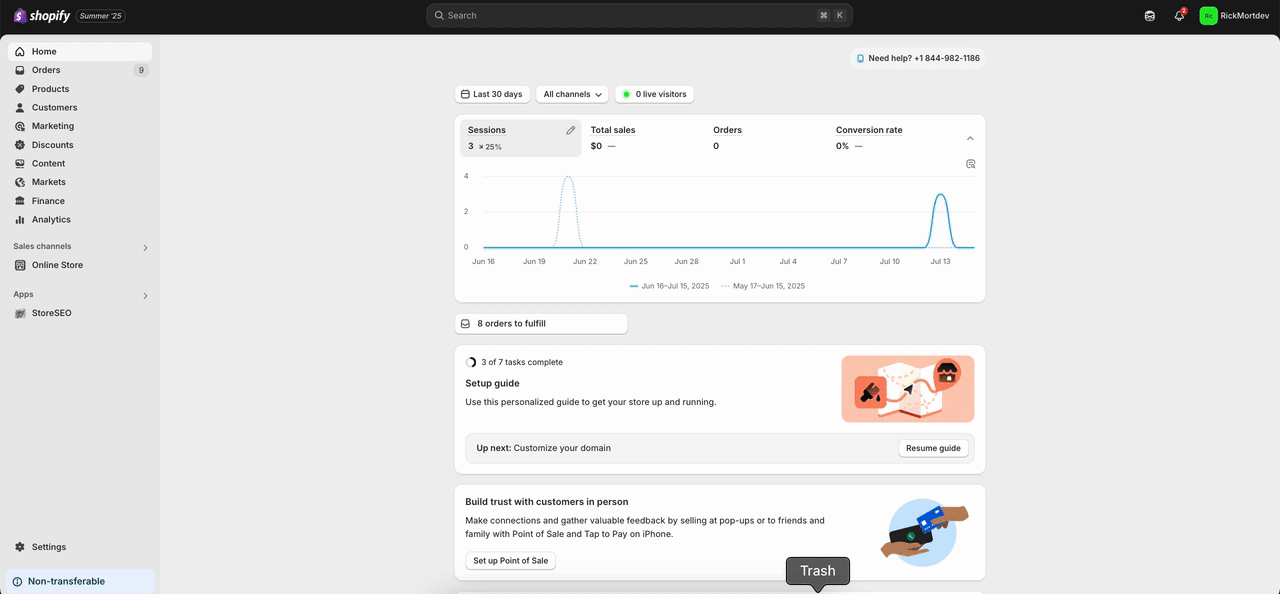
Étape 2 : Optimisez votre article de blog sur Shopify #
Il est maintenant temps d'optimiser Référencement pour votre article de blog Shopify. Comme vous pouvez le voir sur l'image ci-dessous, les détails SEO de votre blog sélectionné sont affichés par StoreSEO. Dans le panneau de droite, vous trouverez également Analyse SEO de base et Analyse SEO détaillée pour trouver les facteurs clés qui doivent être traités pour améliorer le score SEO.
Analyse SEO de base #
Commençons par Analyse SEO de base. Ici, nous devons nous assurer de différents critères tels que le placement d'un mot-clé unique aux endroits requis, le maintien d'une longueur optimisée du méta-titre et de la description, etc. Nous allons maintenant vous montrer comment procéder un par un.
Le mot clé ciblé est unique #
Tout d’abord, vous devez Choisissez le mot clé de focus approprié. Ceci est crucial car le blog est indexé sur les moteurs de recherche en fonction de ce mot-clé. Pour faire simple, vos lecteurs ou votre public potentiel auront plus de chances de trouver votre article de blog si leur mot-clé de recherche et le mot-clé ciblé que vous avez sélectionné correspondent.
Par conséquent, vous devez être très prudent et faire recherche de mots clés appropriée lors du choix du mot clé cible. Voici quelques éléments à prendre en compte :
Pertinence des mots clés : Assurez-vous que le mot clé est pertinent pour le sujet de votre blog, votre entreprise, votre public et votre niche. Supposons que vous vendiez des chaussures de ville en cuir. Votre mot clé cible doit être pertinent pour ce produit. Maintenant, vous sélectionnez un mot clé à volume de recherche élevé contenant le terme «sac en cuir' ou 'chemise formelle. Ces mots-clés sont extérieurs à votre niche de produit. Ainsi, même s'ils peuvent avoir un volume de recherche plus élevé, ils ne constitueront pas une option pertinente.
Volume de recherche : Les mots-clés avec un volume de recherche plus élevé génèrent davantage de recherches chaque mois. Si vous sélectionnez des mots-clés avec un volume de recherche plus élevé, vous êtes plus susceptible de faire face à une concurrence plus forte. Plus vous utilisez de mots-clés spécifiques, plus vous pouvez atteindre votre public cible avec précision.
Maintenant, si vous choisissez un mot-clé à longue focalisation tel que «Chaussures habillées en cuir synthétique résistant à l'eau" vous avez un mot clé unique mais il y a moins de chances pour que les clients utilisent ce mot clé entier lors d'une recherche. C'est pourquoi il n'a pas un bon volume de recherche comme le montre l'image ci-dessous.
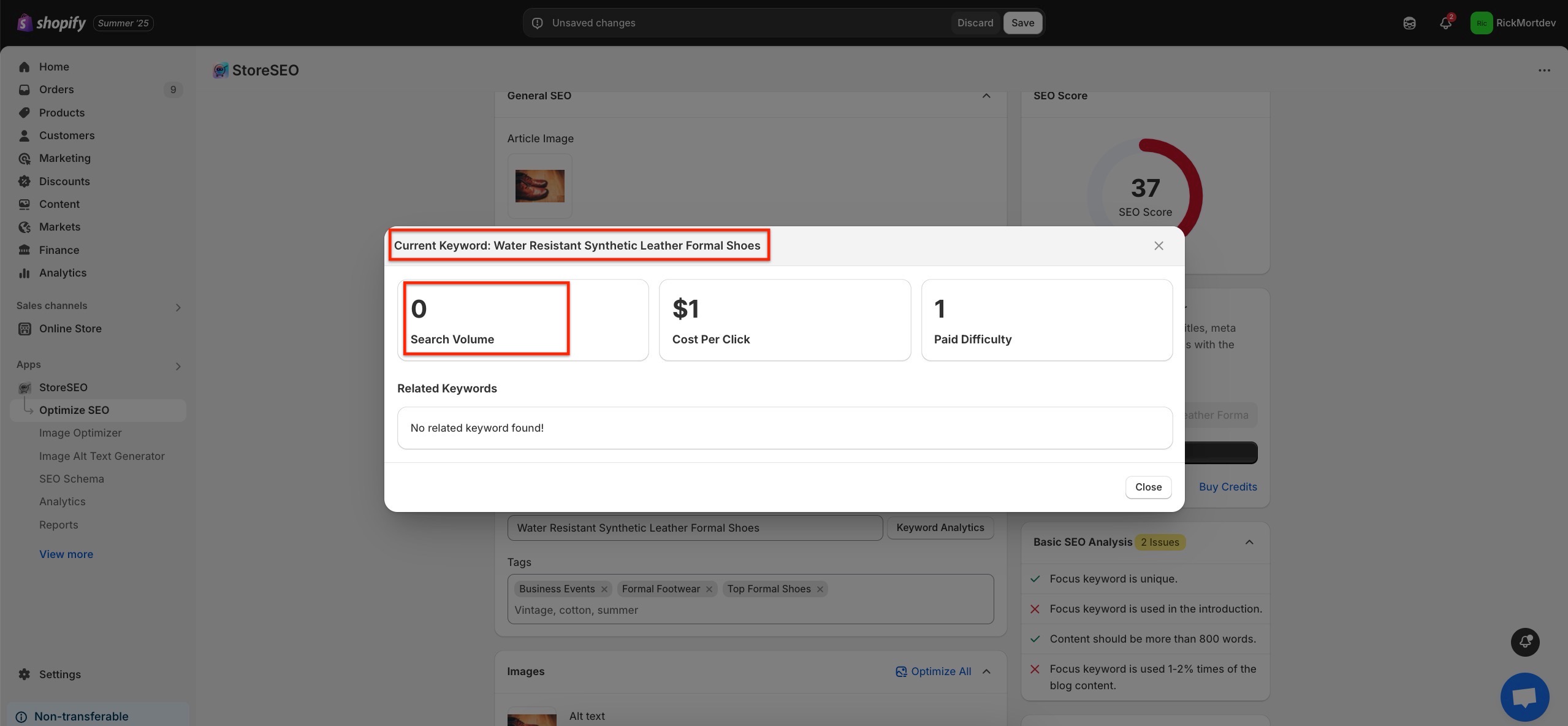
Maintenant, si vous choisissez un mot-clé de focus court comme «Chaussures en cuir", vous constaterez qu'il a un volume de recherche élevé comme le montre l'image ci-dessous. Cependant, ces mots clés populaires génèrent trop de trafic et seront beaucoup plus difficiles à classer et à atteindre votre public.
En revanche, si vous sélectionnez le mot-clé focus 'Chaussures en cuir synthétique" vous avez un bon volume de recherche (pas trop élevé) et il y a une plus grande possibilité d'indexation sans faire face à une forte concurrence. C'est pourquoi il s'agit de l'option de mot-clé cible la plus appropriée dans ce cas particulier.
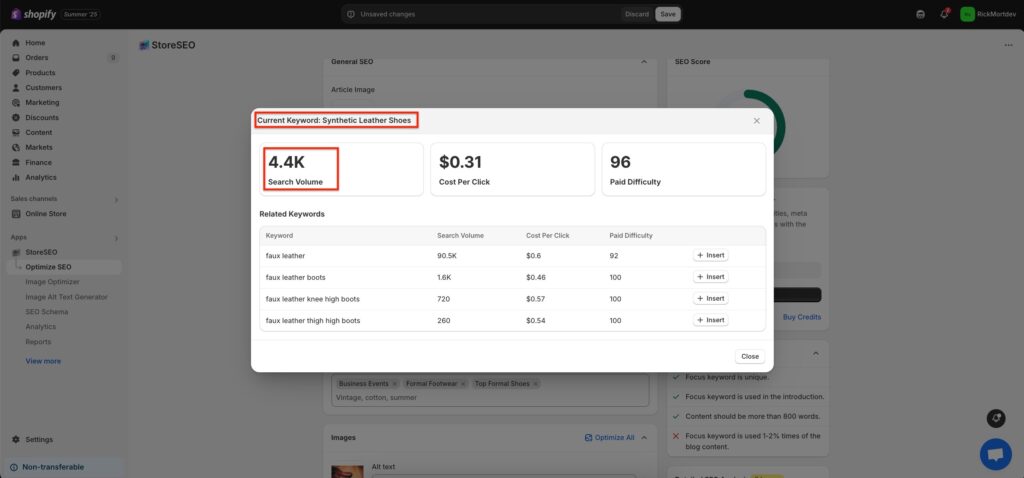
Coût par clic : Si vous diffusez des annonces avec des mots clés particuliers, le coût par clic détermine le budget approximatif de la campagne publicitaire. Par conséquent, choisir des mots clés avec un coût par clic plus élevé signifie que vous devez disposer d'un budget de campagne plus important. Veuillez noter qu'il s'agit d'une valeur estimée et vous n'avez pas à vous en soucier si vous ne diffusez aucune publicité.
Difficulté payée : Cela représente la demande de mots-clés lorsqu'ils sont utilisés dans des annonces payantes. Une difficulté de paiement plus élevée indique que le mot-clé a également plus de concurrence dans la recherche organique. Il s'agit donc d'une mesure importante lors de la recherche de mots-clés.
Mots clés associés : N'oubliez pas de vérifier les mots-clés associés à un mot-clé particulier. Ces mots-clés associés vous donneront des suggestions de mots-clés supplémentaires. Ainsi, vous pourriez tomber sur une meilleure option de mot-clé ciblé. Assurez-vous que les mots-clés associés correspondent à votre produit, votre entreprise, votre public et votre niche.
Pour revenir à l'optimisation des articles de blog sur StoreSEO, placez votre mot-clé préféré dans le 'Mot clé ciblé" champ. Cliquez sur le "Analyse des mots-clés" bouton pour obtenir instantanément le Volume de recherche, Coût par clic, Difficulté payée et mots-clés associés pour votre mot-clé.
Ici, nous avons sélectionné «Chaussures en cuir synthétique" comme mot-clé principal. Il est recommandé d'utiliser différents mots-clés principaux pour différents articles de blog. Veuillez choisir un mot-clé en fonction de votre activité et du sujet du blog. recherche de mots clés pour Shopify pour ça.
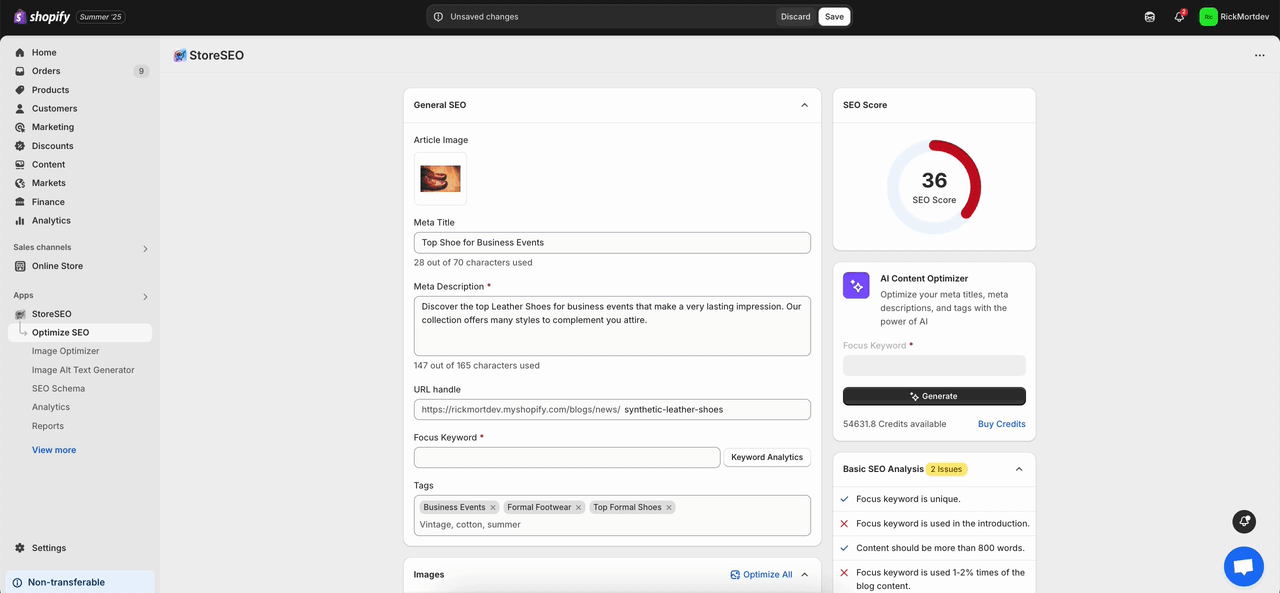
Le mot clé Focus est utilisé dans l'introduction #
Ensuite, assurez-vous que le mot-clé focus est utilisé dans l'introduction de l'article de blog. Pour modifier votre article de blog, accédez à Canaux de vente dans le panneau latéral gauche de votre tableau de bord Shopify. Ensuite, sélectionnez «Boutique en ligne" et cliquez sur le "Articles de blog' option. Sélectionnez le blog que vous souhaitez modifier. Assurez-vous de placer le mot-clé focus dans l'introduction. Comme vous pouvez le voir sur l'image ci-dessous, l'introduction de notre blog contient 'Chaussures en cuir synthétique" ou notre mot-clé sélectionné.
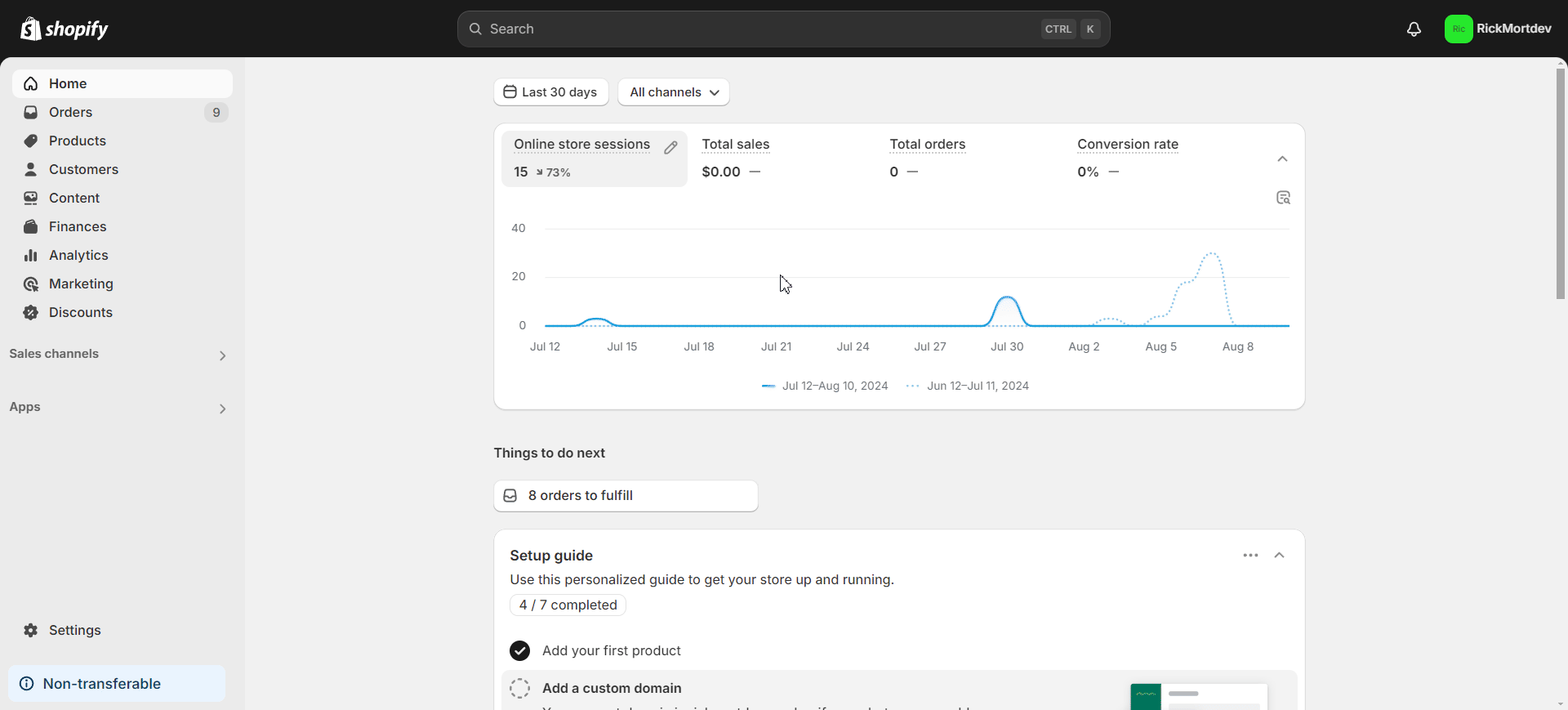
Le contenu doit comporter plus de 800 mots #
Incluez plus de 800 mots dans le contenu du blog pour optimiser davantage le score SEO. Assurez-vous que le contenu de votre blog contient plus de 800 mots tout en conservant sa pertinence et son sens, comme le montre l'image ci-dessous.
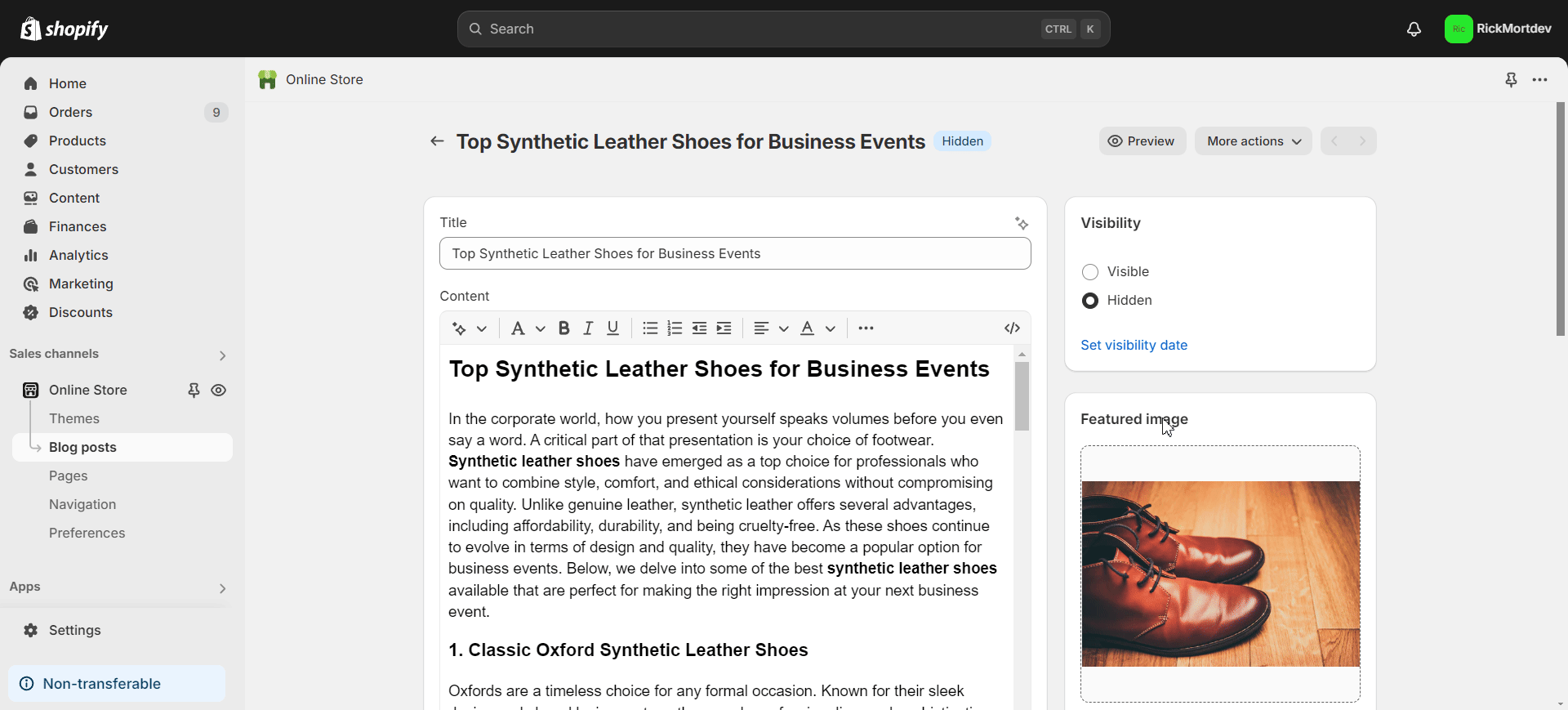
Le mot clé Focus est utilisé 1 à 2% fois dans le contenu du blog #
Votre mot clé principal doit être utilisé 1 à 21 fois par jour dans le contenu du blog. Mais évitez de trop utiliser de mots clés ou de les placer de manière forcée ou peu naturelle. Comme vous pouvez le voir sur l'image ci-dessous, nous avons placé notre mot clé principal sélectionné pour maintenir la fréquence idéale mentionnée ci-dessus.
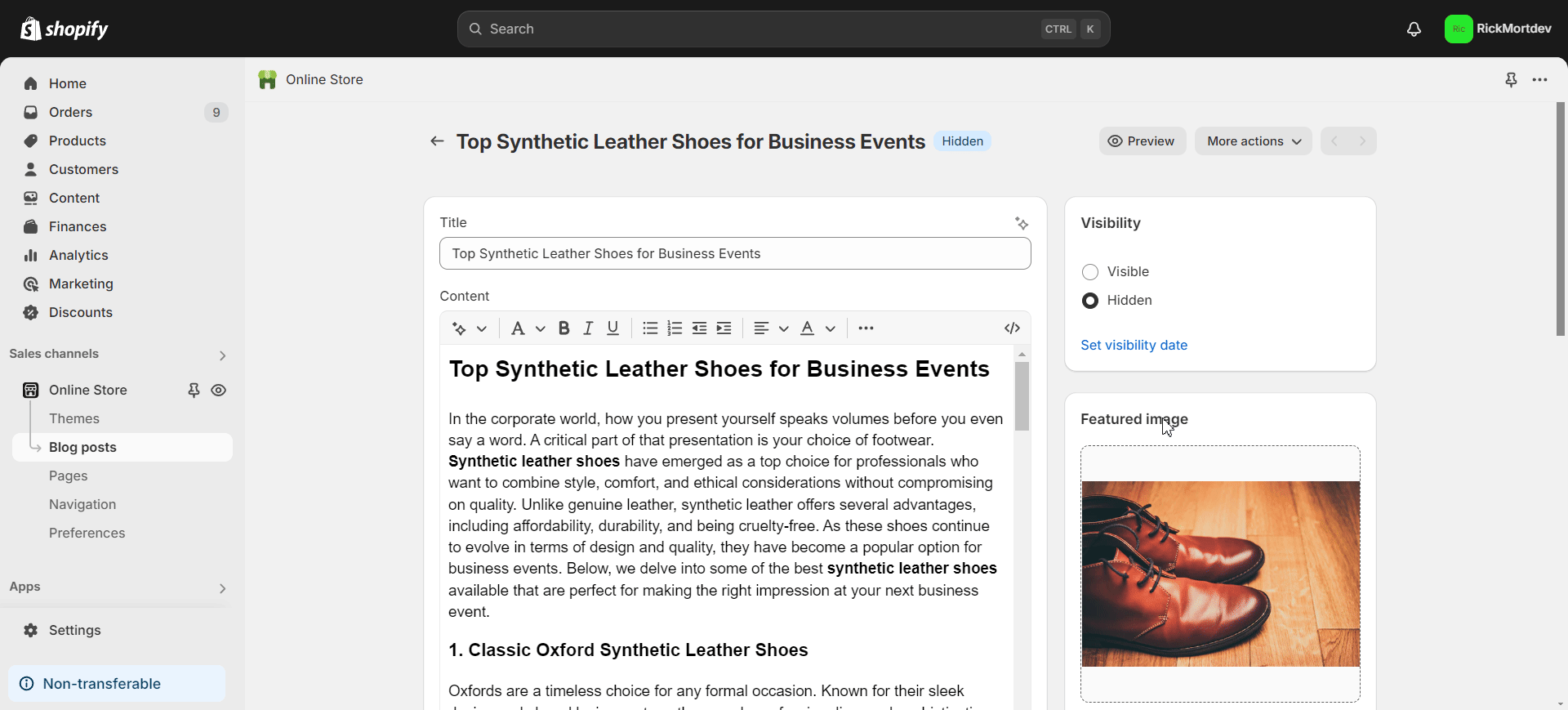
Analyse SEO détaillée #
Nous allons maintenant passer à la Analyse SEO détaillée. Pour cela, nous devons nous assurer de placer le mot-clé cible dans le texte alternatif de l'image, les sous-titres, la méta description et l'URL et de répondre à quelques autres exigences. Laissez-nous vous montrer comment faire tout cela.
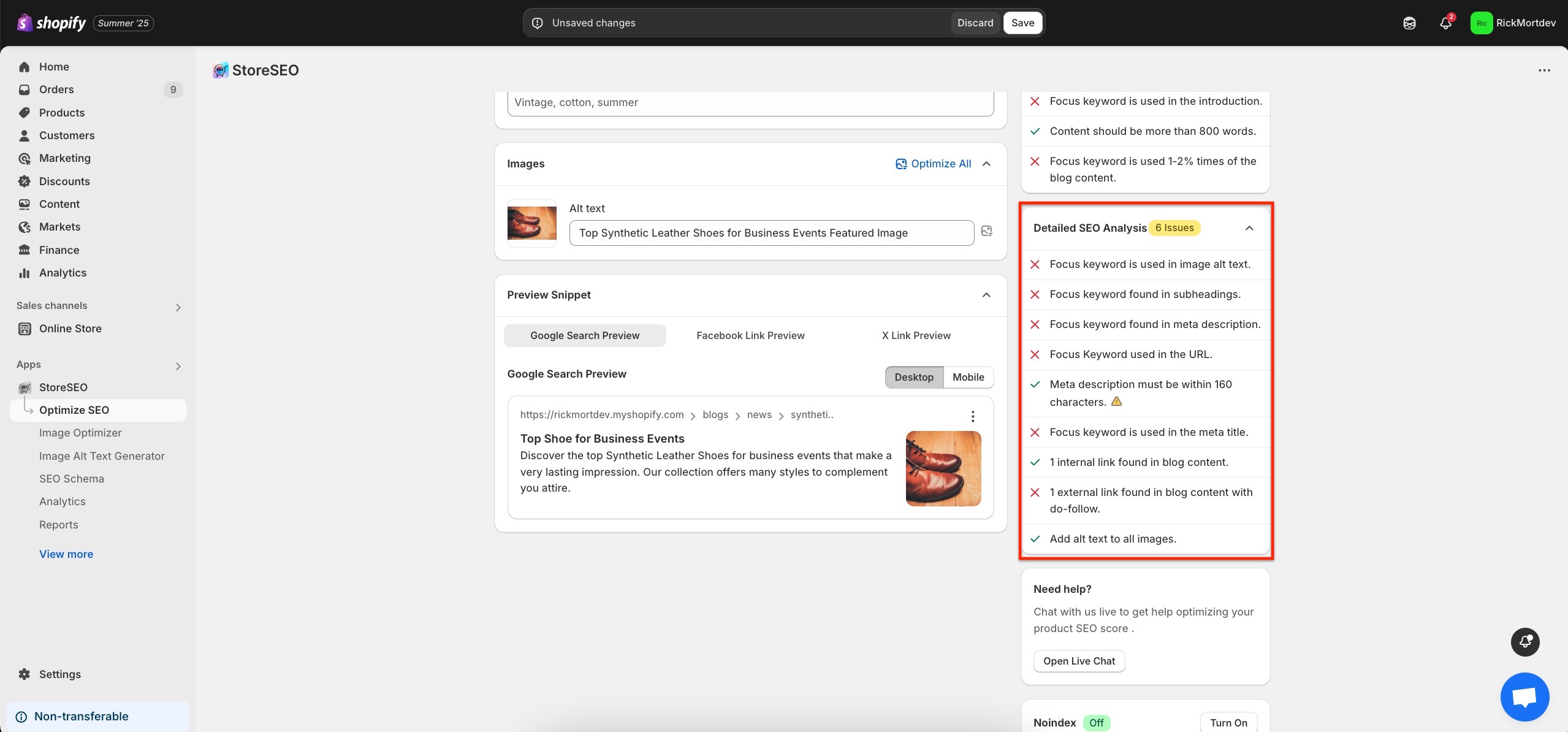
Le mot-clé Focus est utilisé dans le texte alternatif de l'image #
Assurez-vous que le mot-clé focus est utilisé lors de l'ajout du texte alternatif de l'image en vedette du blog. Pour cela, accédez à l'optimisation des articles de blog StoreSEO pour le blog de votre choix. Sous le 'Images' section, vous trouverez le 'Texte alternatif' champ. Placez le texte alternatif souhaité contenant le mot-clé ciblé dans ce champ.
Comme vous pouvez le voir dans l'image ci-dessous, le champ de texte Alt « Top Chaussures en cuir synthétique pour les événements d'affaires, l'image en vedette du blog contient notre mot-clé sélectionné (marqué en gras).
Mot clé ciblé trouvé dans les sous-titres #
Assurez-vous que les sous-titres de votre blog contiennent le mot-clé principal. Vous pouvez l'ajouter à votre sous-titre lors de la modification de votre blog à partir du tableau de bord Shopify, comme indiqué précédemment. Comme vous pouvez le voir sur l'image ci-dessous, notre sous-titre « Classic Oxford » Chaussures en cuir synthétique" contient notre mot-clé sélectionné (marqué en gras).
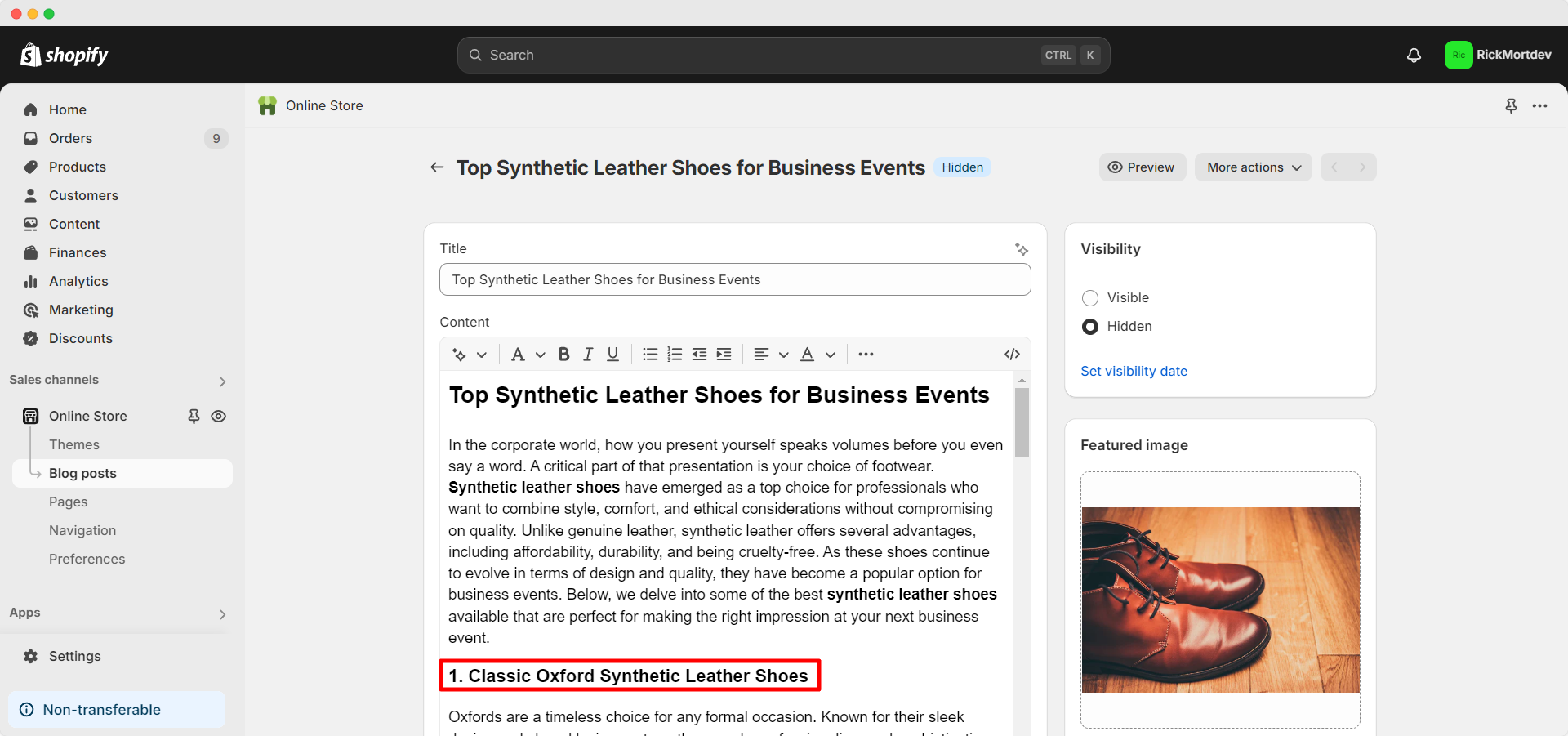
Mot-clé ciblé trouvé dans la méta description #
Votre méta description doit contenir le mot clé que vous avez sélectionné. À partir de l'optimisation des articles de blog StoreSEO, vous pouvez ajouter le mot clé cible dans le champ de méta description. Notre méta description est la suivante :
Découvrez le top Chaussures en cuir synthétique pour des événements professionnels qui marquent les esprits. Notre collection propose une variété de styles pour compléter votre tenue.
Il contient donc notre mot-clé cible sélectionné (marqué en gras)
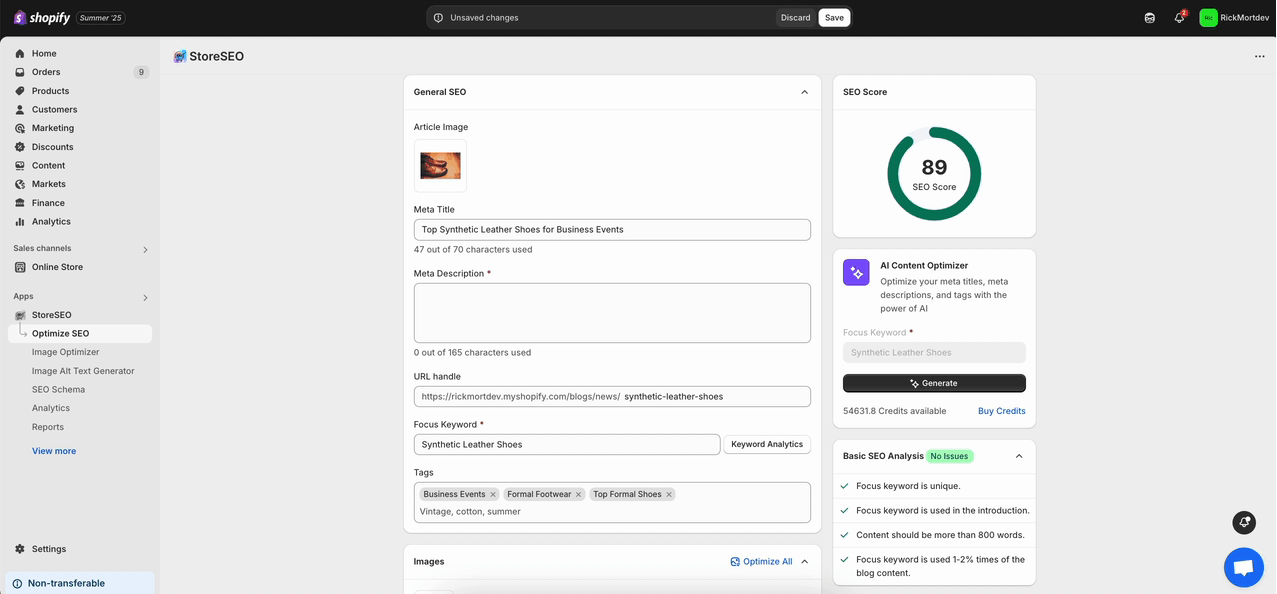
Mot clé ciblé utilisé dans l'URL #
Assurez-vous que l'URL de l'article de blog Shopify contient le mot-clé ciblé. Vous pouvez modifier l'URL sous le bouton «Poignée d'URL" lors de l'optimisation de votre article de blog avec StoreSEO. Comme vous pouvez le voir, le champ URL contient "Chaussures en cuir synthétique" ou notre mot-clé sélectionné.
Note: Si votre article de blog a déjà été indexé et que vous souhaitez modifier son URL, il est recommandé de créer une redirection d'URL.
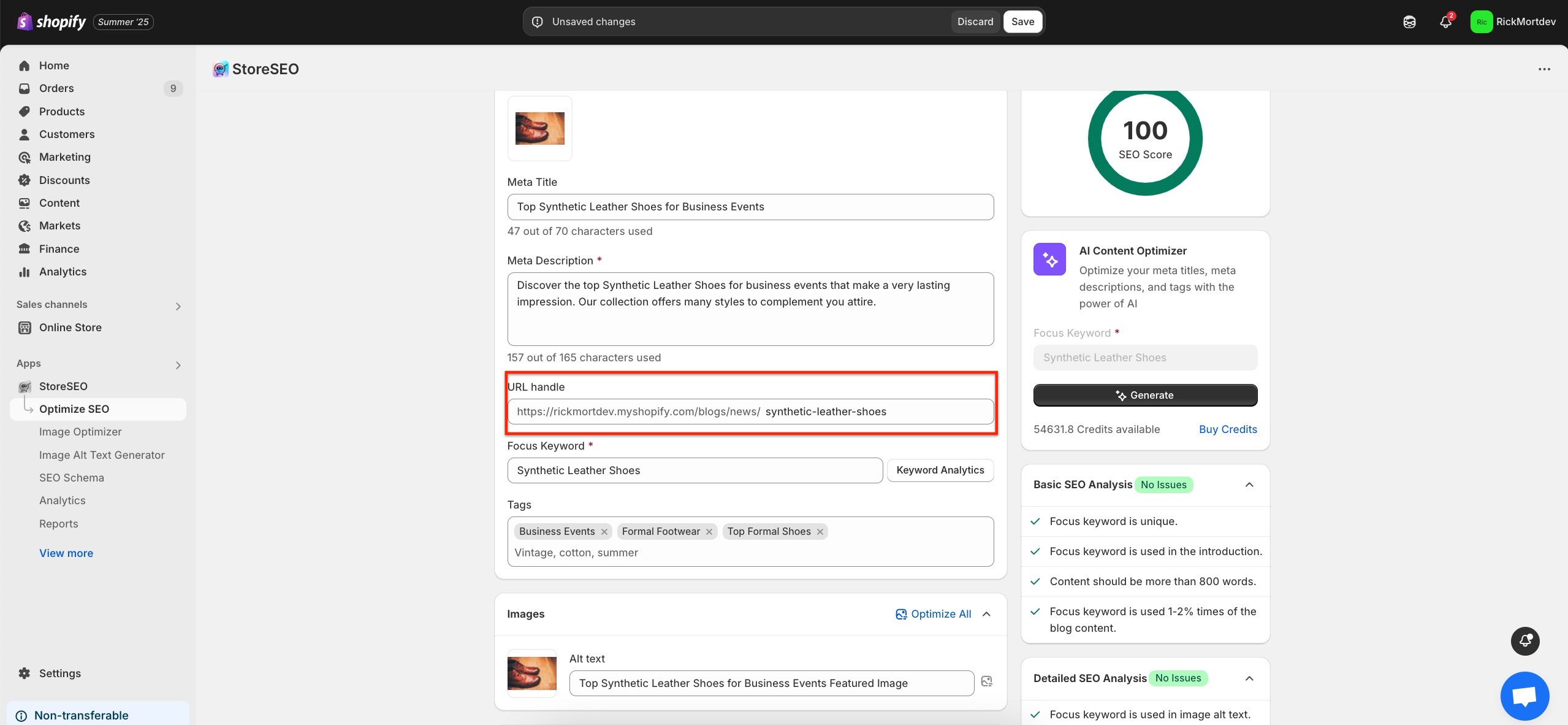
La méta description doit comporter 160 caractères maximum #
Ton méta description de l'article de blog devrait idéalement comporter 160 caractères maximum. Comme vous pouvez le voir sur l'image ci-dessous, notre méta description comporte 159 caractères, ce qui répond à cette exigence.
Le mot clé Focus est utilisé dans le méta-titre #
Assurez-vous que votre méta-titre contient le mot-clé que vous avez sélectionné. Comme vous pouvez le voir sur l'image ci-dessous, notre méta-titre est le suivant :
Haut Chaussures en cuir synthétique pour tout événement professionnel ou cadre formel
Ainsi, le méta-titre contient notre mot-clé sélectionné (marqué en gras).
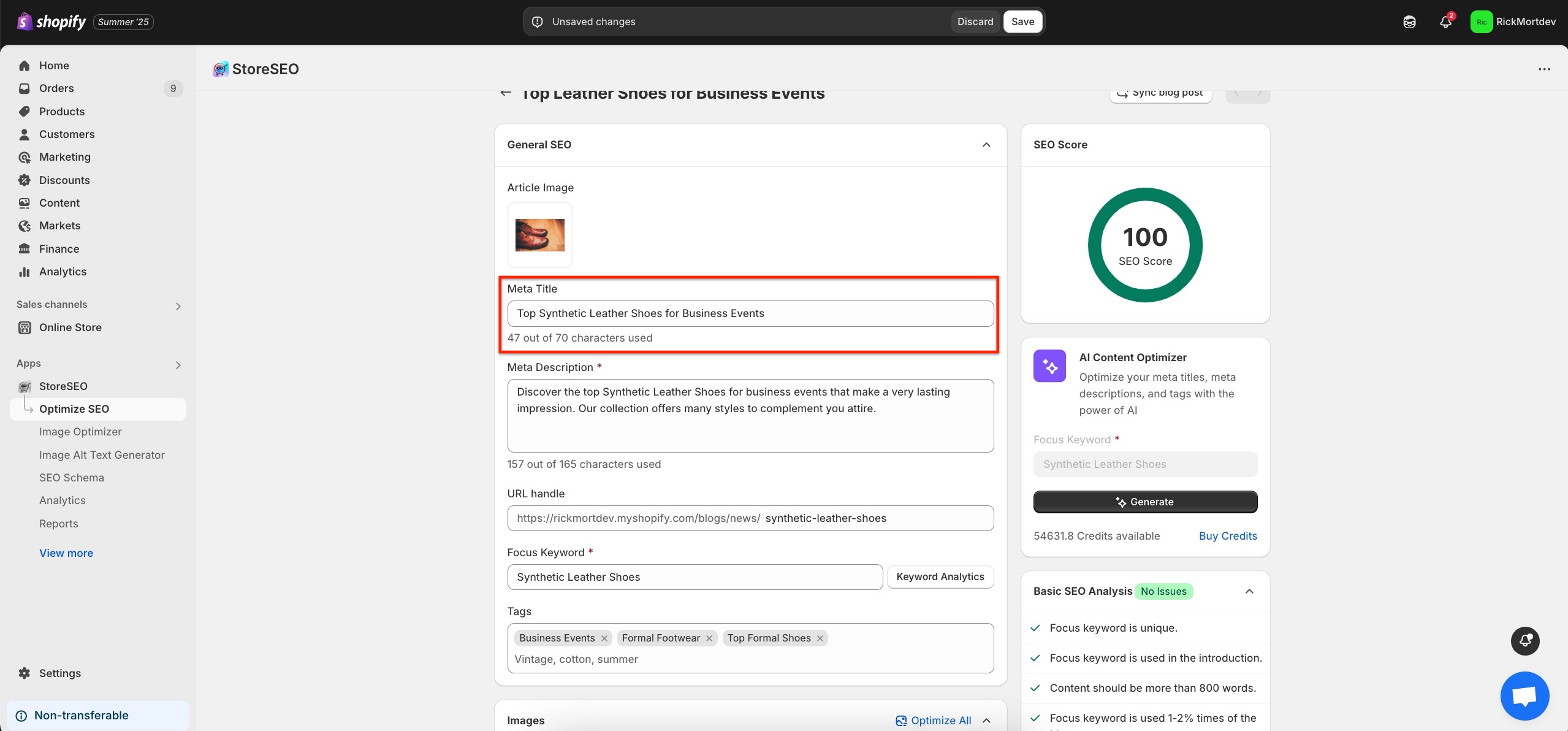
1 lien interne trouvé dans le contenu du blog #
Le contenu de votre blog doit contenir 1 lien interne. Un lien interne signifie un lien vers un autre blog, une page ou un produit de votre boutique Shopify. Pour l'ajouter, procédez à la modification de votre article de blog à partir du tableau de bord Shopify comme décrit précédemment. Sélectionnez les mots que vous souhaitez définir comme texte d'ancrage et cliquez sur l'option à trois points dans le champ «Contenu' section. Ensuite, sélectionnez la section 'Insérer un lien' option. Entrez le lien interne dans le champ prévu à cet effet. Vous pouvez également choisir si le lien s'ouvrira dans la même fenêtre ou dans une nouvelle fenêtre après avoir cliqué. Vous pouvez également définir un titre de lien. Cliquez sur l'option 'Insérer un lien" lorsque vous avez terminé.
Essayez de créer un lien vers une page ou un article de blog de votre boutique en rapport avec le sujet du blog ou le produit ou service évoqué dans votre blog. Comme vous pouvez le voir sur l'image ci-dessous, nous avons lié en interne notre blog à notre page FAQ.
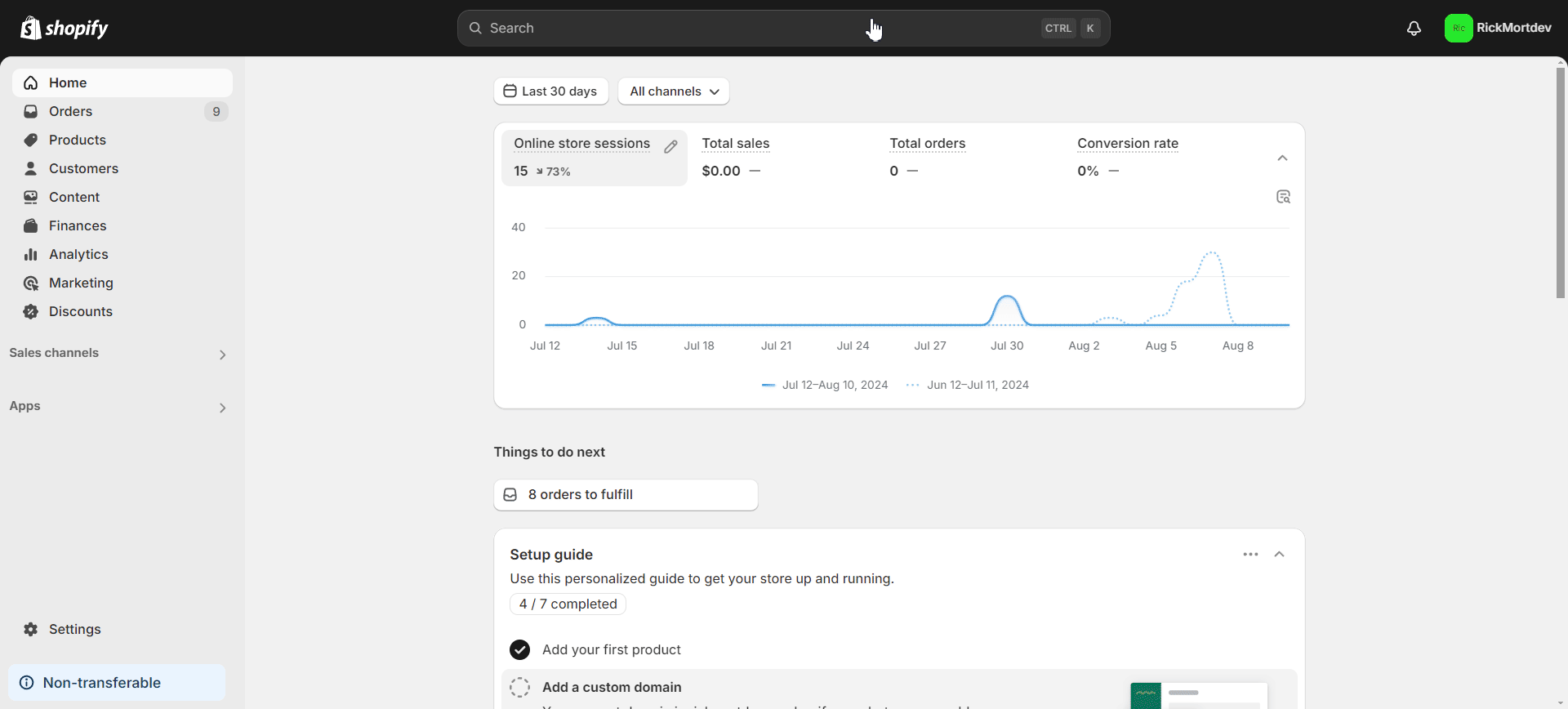
1 lien externe trouvé dans le contenu du blog avec do-follow #
Conservez un lien externe dans le contenu du blog avec do-follow. Un lien externe signifie un lien vers des pages externes en dehors de votre boutique Shopify. Incluez-le lors de la modification de votre article de blog comme indiqué dans le point précédent.
Essayez de créer un lien externe de haute autorité vers un article ou une page de blog. De plus, le lien externe doit être pertinent par rapport au sujet du blog ou au produit ou service évoqué dans votre blog. Comme vous pouvez le voir sur l'image ci-dessous, nous avons inclus 1 lien externe dans le contenu de notre blog.
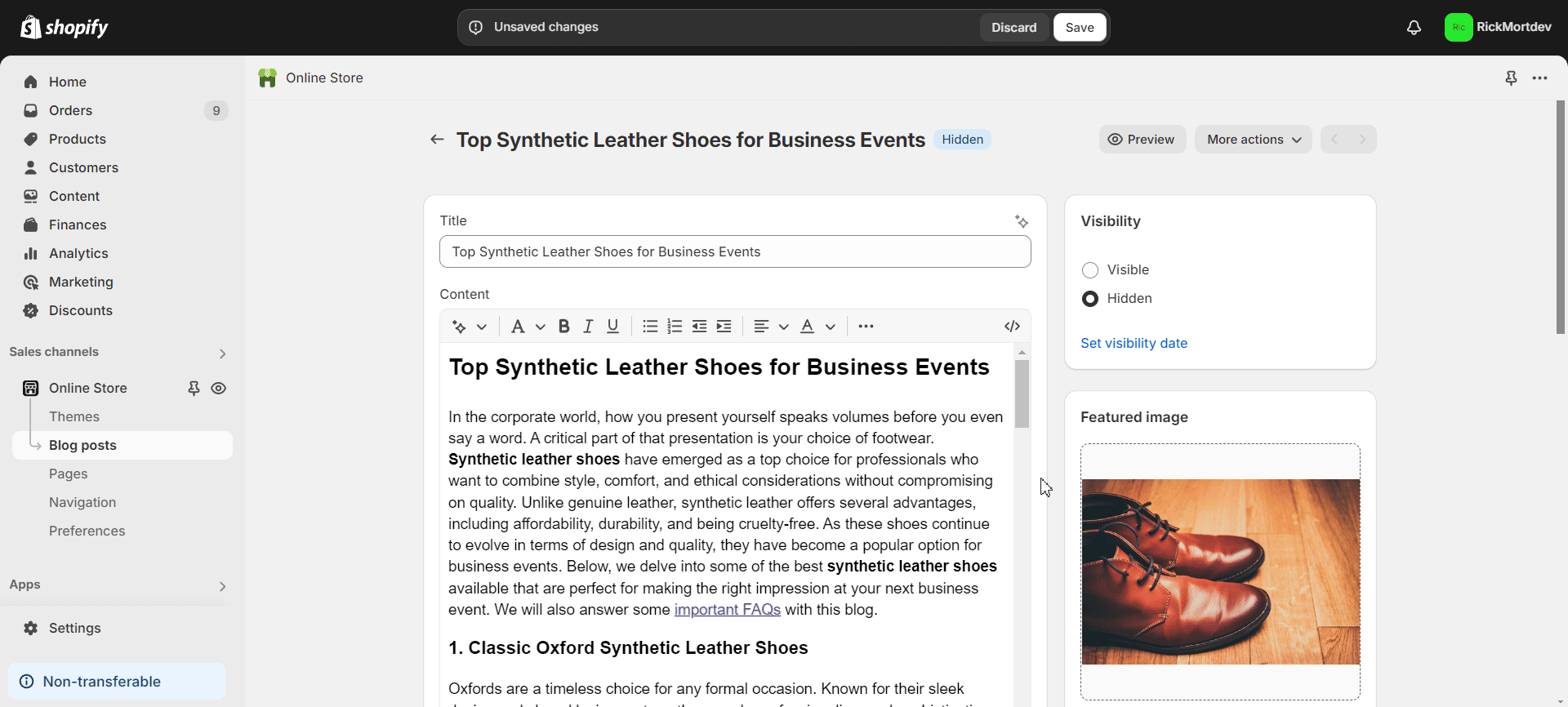
Ajouter du texte alternatif à toutes les images #
Si vous avez plusieurs images dans l'article de blog, assurez-vous que le mot-clé focus est utilisé dans le texte alternatif de toutes les images. Vous devez le faire lors de la modification de votre article de blog à partir du tableau de bord Shopify, comme indiqué précédemment. Sous le 'Contenu" lors de l'édition d'un article de blog, double-cliquez sur n'importe quelle image dans le contenu du blog. Vous pourrez alors ajouter le texte alternatif dans la section 'Texte alternatif de l'image' champ.
Les images utilisées dans notre article de blog contiennent du texte alternatif pertinent, comme indiqué dans l'image ci-dessous.
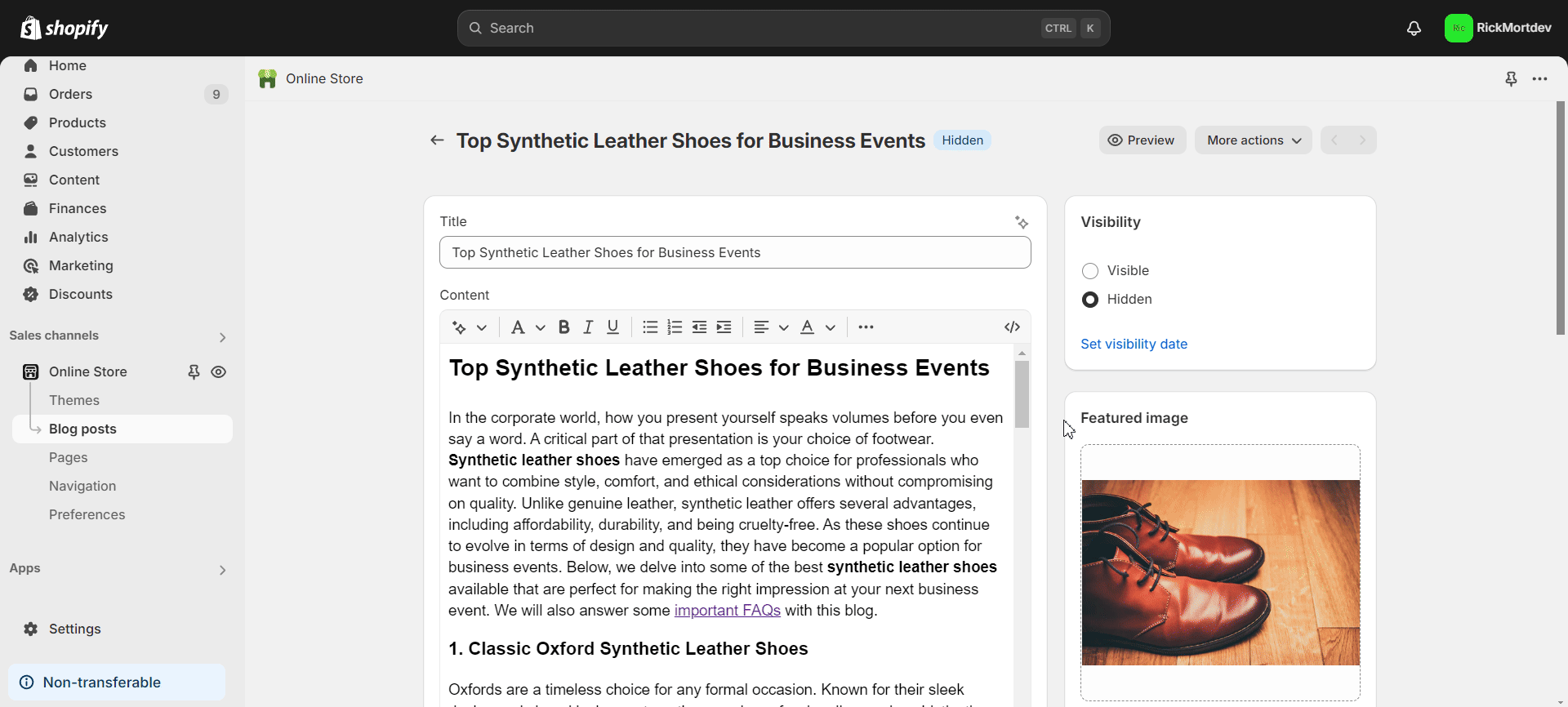
En suivant ces étapes, vous pouvez prendre en compte tous les facteurs SEO importants pour obtenir le meilleur score d'optimisation possible pour votre article de blog. Si vous avez besoin d'aide pour optimiser votre contenu pour le référencement avec la puissance de l'IA, vous pouvez également utiliser l' Optimiseur de contenu AI StoreSEO.
Une fois que vous avez terminé l'optimisation de votre article de blog et que vous êtes satisfait du score SEO global, cliquez sur le bouton «Sauvegarder' bouton.
Voici comment vous pouvez facilement configurer Référencement pour les articles et les pages de blog sur Shopify en utilisant StoreSEO. Besoin d'aide ? N'hésitez pas à contacter notre équipe de soutien dédiée pour tout type de requête.














